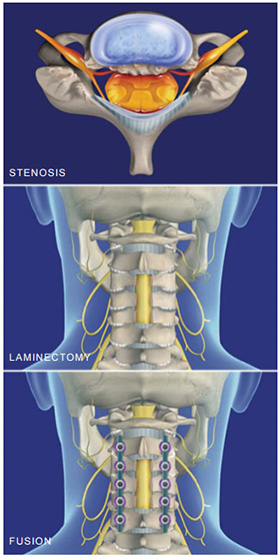Laminectomy (Cervical) with Fusion – Fact Sheet

Overview
This procedure removes a section of bone from the rear of one or more vertebrae to relieve the painful and disabling pressure of stenosis. The spine is then stabilized with rods and screws.
Preparation
Anesthesia is administered, and the patient is positioned to give the surgeon access to the back of the neck. The surgeon creates a small incision to expose the vertebrae.
Cutting the Bone
The surgeon uses a high-speed burr to cut a rectangular trough of bone from the vertebrae.
Removing the Lamina
The surgeon carefully removes the bone from the rear of the vertebrae, opening up the spinal canal and relieving pressure from the spinal cord and nerve roots.
Clearing Bone Spurs
The surgeon inspects the spinal canal and foramen – the openings through which the nerve roots exit the spinal canal. Any bone spurs behind the spinal cord and nerve roots are cleared away.
Fusing the Vertebrae
Once all problem areas have been corrected, the surgeon creates a fusion to stabilize the cervical spine. The surgeon places screws in the vertebrae, and a burr is used to decorticate the joints. Rods are placed through the screws in the vertebrae, locking the spine in a natural position. In some cases, bone graft may be placed in the facet joints to promote the growth of bone that will complete the fusion.
End of Procedure
After the spine is stabilized, the incision is closed. Drains may be inserted in the wound to prevent fluid buildup. The patient may require a cervical collar for a brief period after the procedure.

 Menu
Menu